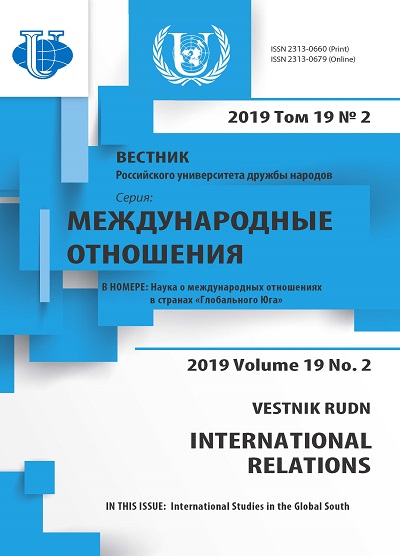International Development Agenda in Resolutions of General Assembly and ECOSOC of the United Nations from 1946 to 2000
- Authors: Ignatov A.A.1, Safonkina E.A.1
-
Affiliations:
- Russian Presidential Academy of National Economy and Public Administration (RANEPA)
- Issue: Vol 19, No 2 (2019): International Studies in the Global South
- Pages: 274-283
- Section: INTERNATIONAL ECONOMIC RELATIONS
- URL: https://journals.rudn.ru/international-relations/article/view/21465
- DOI: https://doi.org/10.22363/2313-0660-2019-19-2-274-283
- ID: 21465
Cite item
Full Text
Abstract
The United Nations established after the Second World War by the winner countries was a key institution which formed the conceptual basis for international development possessed all necessary instruments and knowledge for its implementation in concrete countries. The paper explores a role of two main UN bodies - General Assembly (UN GA) and Economic and Social Council (ECOSOC) in forming and pushing international development from the Organization establishment and till adoption of the Millennium Development Goals (MDGs) in 2000. To implement this research task the authors apply content-analysis and comparative historical analysis methods. A special database of the UN GA and ECOSOC documents dated 1946-2000 devoted to the development issues was made as well. The authors come to a conclusion that at the initial stage (1946-1959) both the UN GA and ECOSOC handled the similar tasks aimed at creating a new system of development institutions. After the adoption in 1961 the first Development Decade by the UN and till 2000 a process of division of powers of two bodies started. During this period a share of program documents in the GA discourse increased that laid a foundation for adoption by the global community the MDGs in 2000, operational and organizational issues were absorbed by the ECOSOC. The UN General Assembly was an important platform for the international dialogue on development which made it possible for the global community to adopt the Millennium Development Goals and Sustainable Development Goals (SDGs) in the 21st century. The UN GA acted as a catalyzing power for inclusion of new development issues in the agenda and creations of instruments and mechanisms for their implementation. The ECOSOC played a technical and coordinating role in a process of elaborating the international development agenda.
About the authors
Alexander Alexandrovich Ignatov
Russian Presidential Academy of National Economy and Public Administration (RANEPA)
Author for correspondence.
Email: ignatov-aa@ranepa.ru
Researcher of the Center for International Institutions Research (CIIR)
Moscow, Russian FederationElizaveta Andreyevna Safonkina
Russian Presidential Academy of National Economy and Public Administration (RANEPA)
Email: safonkina-ea@ranepa.ru
Researcher of the Center for International Institutions Research (CIIR)
Moscow, Russian FederationReferences
- Borzova, A.Yu. (2012). Brazil Approaches to the UN Reform. International Organisations Research Journal, 7 (3), 237—245.
- Breen, С. (2007). The Necessity of a Role for the ECOSOC in the Maintenance of International Peace and Security. Journal of Conflict and Security Law, 12 (2), 261—294. doi: 10.1093/jcsl/krm012
- Chesterman, S. (2011). The Outlook for UN Reform. NYU School of Law, Public Law Research Paper No. 11—55. URL: https://papers.ssrn.com/sol3/papers.cfm?abstract_id=1885229 (accessed: 24.10.2018).
- Chimni, B.S. (2011). ECOSOC and International Economic Institutions. In: Wilde, R., Charlesworth, H., Schrijver, N., Krisch, N., Chimni, B.S., Gowlland-Debbas, V., Klabbers, J., Yee, S. & Shearer, I. United Nations Reform Through Practice: Report of the International Law Association Study Group on United Nations Reform. URL: https://papers.ssrn.com/sol3/papers.cfm?abstract_id=1971008 (accessed: 24.10.2018).
- Cinelli, C. (2013). The G-20 at the UN ECOSOC: A Complementary Perspective. In: Bossone, B., Cafaro, S., Di Bene¬detto, S. & Malaguti, M.C. Legitimacy and Effectiveness in Global Economic Governance. Cambridge Scholars Publishing. P. 80—106.
- Degterev, D.A. (2013). International Development Assistance: Aid Efficiency and Evolution of International Law Regimes. Moscow: LENAND.
- Fasulo, L. (2015). An Insider’s Guide to the UN. 3rd ed. Yale University Press.
- Gnatik, E.A. (2014). Role of the UN in the Elaboration of International Health Standards. RUDN Journal of Law, 4, 304—313.
- Green, J.F. (1952). ECOSOC: Its Role and Its Achievements. World Affairs, 115 (3), 74—76.
- Isachenko, T.M. (2010). The Interaction of international Organizations in the Processes to Formation of Trade Policy. Vestnik MGIMO-University, 6, 215—221.
- Jansen, R. (Eds.). (2014). Measuring International Trade and Economic Globalization. Paper Prepared for the IARIW 33rd General Conference, Rotterdam, the Netherlands, August 24—30. URL: https://unstats.un.org/unsd/trade/events/ 2014/mexico/documents/session1/IARIW%20-%20Session%207C%20-%20Jansen%20Paper.pdf (accessed: 04/10/2018).
- Larionova, M.V. & Safonkina, E.A. (2018). The First Five Decades of Cooperation for Development. Actors, Achievements and Challenges. International Organisations Research Journal, 13 (4), 96—121. doi: 10.17323/1996-7845-2018-04-05.
- Lubin, I. & Murden, F. (1955). ECOSOC: Concept Versus Practice. Journal of International Affairs, 9 (2), 67—78.
- Meltzer, R.I. (1978). Restructuring the United Nations System: Institutional Reform Efforts in the Context of North—South Relations. International Organization, 32 (4), 993—1018. doi: 10.1017/S0020818300032069.
- Rietkerk, A. (2015). In Pursuit of Development: the United Nations, Decolonization and Development Aid, 1949—1961. PhD thesis, London School of Economics and Political Science (LSE). URL: http://etheses.lse.ac.uk/3158/ (accessed: 24.10.2018).
- Rushton, S. (2010). AIDS and International Security in the United Nations System. Health Policy Plan, 25 (6), 495—504. doi: 10.1093/heapol/czq051.
- Seckinelgin, H. (2009). Global Social Policy and International Organizations: Linking Social Exclusion to Durable Inequality. Global Social Policy, 9 (2), 205—227. doi: 10.1177/1468018109104626
- Sharp, W.R. (1968). Decision-making in the Economic and Social Council. International Organization, 22 (4), 881—901.
- Weiss, T.G. (2013). ECOSOC and the MDGs: What Can Be Done? Global Poverty Summit in Johannesburg, GPS 1/26. 2013. doi: 10.4324/9780203104798.
Supplementary files










